|
|
| |
| EVENTS |
|
|
> Legislative Study Tour to the US Concludes
|
|
|
| |
An 11-day legislative study tour of a selected Pakistani Parliamentary delegation to the United States concluded with the understanding amongst the Parliamentary delegation that it was a fruitful experience which helped them understand the American political system, its separation of powers model, the role, working and importance of Congress and its committees in terms of the power of the purse and the scrutiny and oversight of the executive, the exhaustive support infrastructure available to congress in terms of staffers, Library of Congress and the Congressional Research Service, working of state legislatures vis-�-vis the centre and the local governments, lobbying and how it influences and shapes the dynamics of American political system and the institution of think-tanks and their role in decision-making in the United States. |
|
| |
The Legislative Study Tour was implemented by PILDAT as a part of the Pakistan Legislative Strengthening Consortium � PLSC which is responsible for implementing the 3-year USAID-funded project of Strengthening National and Provincial Legislative Governance � SNPLG in Pakistan. The study tour was undertaken as a part of the objectives under SNPLG to equip legislative stakeholders with know how and tools to better perform their representative, legislative and oversight functions through training and technical advising. The programme in United States was coordinated and organised by WV-US with the support of Lori Hill Productions event Management Company.
|
|
| |
The objective of the Legislative Study Tour was to provide Pakistani legislators and legislative staff with an opportunity to learn from the tools, techniques and best practices of the US legislative system so as to enable them to understand the support infrastructure, staff and institutions that assist deliberation in the US federal and state legislatures. |
|
| |
The delegation comprised 19 members including Speakers of the Provincial Assemblies of Balochistan and NWFP; 13 legislators: 5 MNAs, 3 MPAs (Punjab); 2 MPAs (Sindh), 2 MPAs (NWFP) and 1 MPA (Balochistan); and 4 members of the Legislative Staff including Secretary Senate, Additional Secretary National Assembly and Secretaries of Balochistan and Punjab Assemblies. A List of Participants is attached. |
|
| |
Programme of the legislative study tour combined the Pakistani Parliamentary Delegation�s interaction with the Members and Staff of the US Congress with their exposure to the research facilities and support staff available at US Congress as well as opportunities of comparison of Rules of Procedure and Conduct of Business of the Pakistani and US Legislatures. The programme also provided avenues of learning in detail about demarcation of roles of federal state and local government with an intent to compare the same with the demarcation of role in Pakistan. |
|
| |
The programme began by a pre-departure orientation by the USAID in Islamabad a day before the delegation�s departure for the United States. This was followed by a pre-departure briefing by the Foreign Office of Pakistan to the Parliamentarians. The delegates were briefed in detail on the structure and political system of the United States upon their arrival in the United States, with special emphasis placed on separation of powers, and the demarcation of roles between the centre, state and the local government systems in place in the US. The delegation was split in two groups to visit two separate State Legislatures, Virginia and Pennsylvania respectively, to focus on the working of the state governance system in the United States in relation to the other tiers of governance. A special debrief session was organised after the return of the groups in Washington DC to share the exclusive learning experiences. Major aspects of the study tour included a detailed exposure and avenues of learning and interaction with the Congressional support infrastructure such as Library of Congress, the Congressional Research Service and the individual/committee staffers of members of Congress; introduction to the system of lobbying and how it operates in the United States vis-�-vis Congress and other branches of governance, and the special niche of think tanks and their role and influence in decision making in the United States. |
|
| |
With the budget of around US $ 600 M a year in the case of Library of Congress and about US $ 100 M a year for Congressional Research Service, the two institutions assist members of congress, staffers and committees with their numerous branches, aides and support services such as legal support, legislative drafting, analysis of issues, research reports, orientation to Congressional rules of procedure for new members and staffers and subject area briefings, etc. In addition to these, a member of House of Representatives has around 16 members of staff, which includes a mix of administrative and research staff, while a Senator has over 20 members of staff, paid for by the Congress. A third of these staffers are located in the constituency of a member while the remaining are based in their Congressional offices in Washington. In addition, committees have their own teams of staff which are divided along party basis depending on the majority and minority rule. Interactions with the staffers and other speakers emphasized that the major focus of congress members is their constituency and constituency related issues. A typical member introduces up to a 100 pieces of legislations through his or her term in office. |
|
| |
While the members of Congress are full-time, most state legislatures work part time with part time legislators. Members of the Pakistani delegation had a chance to visit two state legislatures as two separate groups to witness and understand the functioning of these state legislatures. State Legislatures also follow a bicameral legislature with the replica of the centre�s model in the states, however, rules of procedure vary from state to state. The two visits to state legislatures highlighted that although the system embodies tensions alongside the roles of state legislature and the local governments, the demarcation and functioning on ground is effective. The constituents, as is the case in Pakistan, also confuse the roles of their member of congress, state legislature and local government representative. Public interest in politics and elections is rapidly declining with fewer percentages of votes in each election. |
|
| |
Briefings focussing on Congressional rules of procedures emphasised that the Speaker in House of Representative and in the Senate is the leader of the majority party. Only members of the Congress can introduce legislation and most legislation is bi-partisan and not introduced on party basis. For a successful bill many majorities are constructed before it is successful. A bill becomes a law with the signatures of the President.
Committees serve as a strong vehicle of legislative oversight of the executive. Members of Congress try to get on to a committee that can get them re-elected, that gives them more power or that is nearer to their area of policy interest. Membership of committees is decided by each party, it involves an interview process and finally the full house and the Senate vote on finalised membership of committees. Chairmanship of committees is decided on party considerations based on seniority. Committees generally hold public hearings due to the culture of transparency; however they have the option of holding in-camera hearings.
The study programme also introduced lobbying and how it operates in the United States. Interest groups such as industry and consumers, trade associations, individual companies, consumer groups and even foreign countries seek professional help of lobbying firms to propagate for their particular stance and ideas with the legislators and various branches of government. Lobbying is federally regulated through various laws and acts defining its ethics and boundaries. All lobbying firms have to register themselves. The size of lobbying in the US can be ascertained from the number of registered lobbying organisations which stands at over 32000 with the total spending in the last six months of 2003 at more than US $ 1 billion. Other than big businesses and industries, non-government organisations and alliances for social causes also lobby with the Congress and its relevant committees for voicing their concerns and winning support for their agendas. The programme included delegation�s meeting with a professional lobbying organisation as well as a Coalition of NGOs that lobby on the Capitol Hill on the issue of Education.
In an introduction to the impact of think-tanks in legislative policy in United States, a meeting of the delegation with the Centre for Strategic and International Studies � CSIS was arranged. As a think tank CSIS typically looks at regional and international security issues and policy perspectives that Congress will be looking at and analyse them for the future. There are over 200 different think-tanks working in Washington DC alone with special emphasis and specific areas of work. Each think tank, according to its own posture, researches and analyses a set of issues in its subject area and offer policy perspectives to the Congress and the Executive.
The entire programme of the legislative study tour enjoyed intense interaction and participation of the Pakistani delegation in meetings, briefings and discourses. Parliamentarians through their questions and comments not only sought to understand procedures, working and tools of the legislative system in the United States, but also held various dialogues on US policies towards Pakistan in particular and the Muslim world in general in the periphery of the study tour programme. The policy issues came under discussion especially with the delegation�s meeting with Ms. Christina Rocca, Assistant Secretary of State for South Asia, that lasted over 2 hours and was held in-camera. Interaction on policy took place in delegation�s meeting with the CRS, Centre for Universal Education, Senator Chuck Hagel, staffers of the Senate Foreign Relations Committee, Congressman Adam Smith and at the CSIS.
In the Wrap-Up, delegates through sharing and concluding their experiences felt that the study tour offered them lessons that they would like to work on back home in their legislatures such as the provision of offices and staff and strengthening of research services, albeit at a smaller scale. They felt that donor support was required to initially support these services. Some delegates felt that the US, as a strong democracy, was required to help strengthen democracy in Pakistan and not weaken it through siding with undemocratic forces. Delegates believed that legislative study tours were a good learning tool. They felt that for maximising the potential of legislative study tours, these should also include countries that follow a parliamentary system of government. |
|
| |
|
|
| |
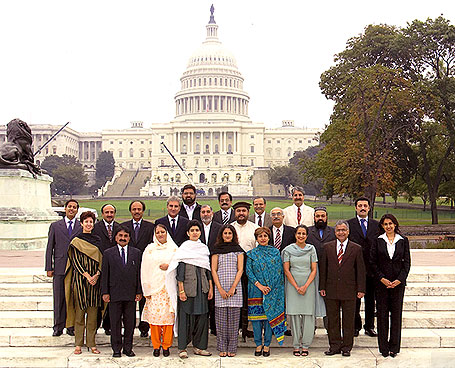
|
|
| |
|
|
| |
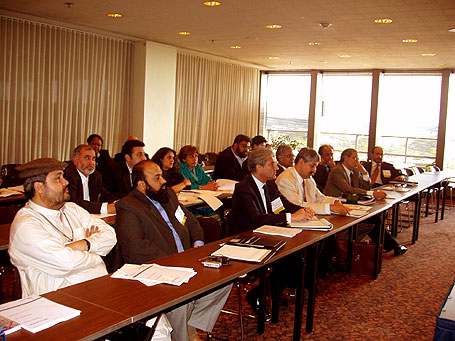
|
|
| |
|
|
| |
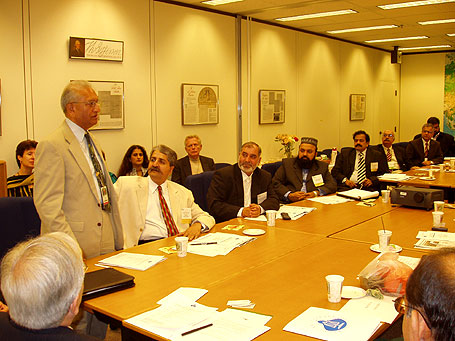
|
|
| |
|
|
| |
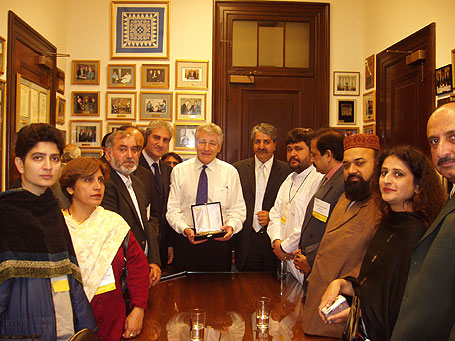
|
|
| |
|
|
| |

|
|
| |
|
|
| |
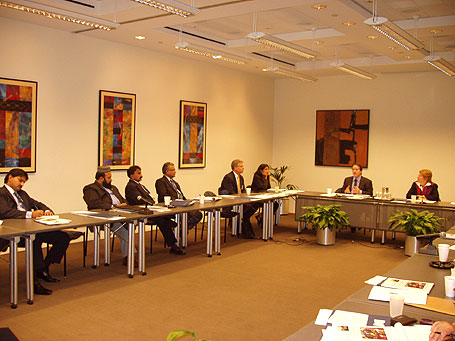
|
|
| |
|
|
| |
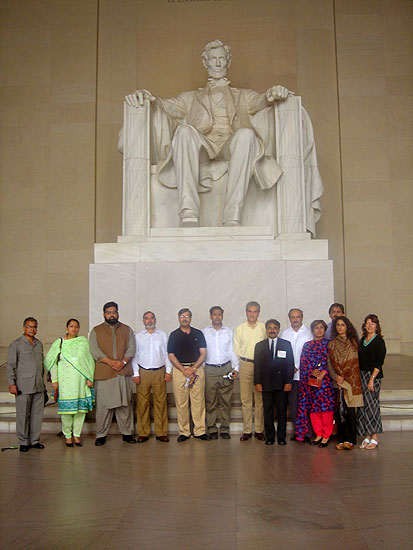
|
|
|
|
|
|
|
|
|